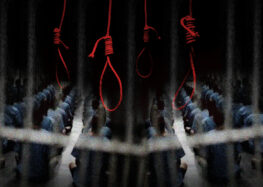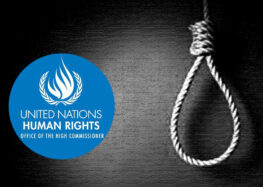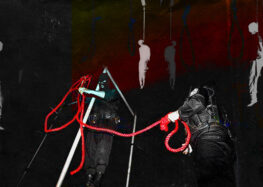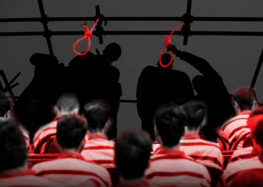Iran Quietly Prepares Six More for the Gallows as Presidential Election Looms
 Juvenile Offender Among Those Reported to be Hanged
Juvenile Offender Among Those Reported to be Hanged
Three Quarters of Recorded Executions Worldwide Last Year Were in Iran
June 5, 2024 – Iran’s upcoming presidential election, after the unexpected death of its president, Ebrahim Raisi, should not divert attention from the dramatically surging executions and growing human rights crisis in Iran that Raisi presided over and advanced, warned the Center for Human Rights in Iran (CHRI).
“An orchestrated selection process masquerading as an election should not obscure the reality in Iran: executions in Iran are accelerating at a horrifying pace, with men, women and children put to death after sham trials in order to silence dissent,” said Hadi Ghaemi, CHRI’s Executive Director.
“Executions have become the leading edge of a repressive apparatus in Iran that will tolerate no dissent,” said Ghaemi. “Gunning down protesters in the streets, sentencing peaceful dissenters to prison, and increasingly, sending people to the gallows, is the Islamic Republic’s answer to its seething population.”
“Now, more than ever, international attention should be on Iran’s use of the death penalty as a tool of repression, not on the passing of a president who was a central player in the Islamic Republic’s human rights atrocities, and certainly not on a bogus election where all viable opposition is banned from participating,” Ghaemi emphasized.
On May 30, 2024, six prisoners, including a reported juvenile offender, Aref Rasouli, were transferred to solitary confinement in Adelabad Prison in Shiraz, Fars province, in preparation for their imminent execution. The only other publicly known individual amongst the six is Morteza Shirmohammadi.
Rasouli was only 17 years old at the time of his alleged crime, a source told the Iran Human Rights organization.
CHRI calls on governments worldwide, especially those who oppose the death penalty, to demand that the Iranian government:
- Immediately halts all executions and ceases issuing arbitrary death sentences that do not conform to international law and standards. This must be backed by robust diplomatic and economic repercussions.
- Adheres to all international obligations, including the International Covenant on Civil and Political Rights and the Convention on the Rights of the Child, which strictly forbid the execution of juvenile offenders.
- Ensures that all defendants are guaranteed full due process and fair trial rights, including the right to independent counsel, and orders all courts to strictly adhere to the prohibition in Iranian law of the use of forced “confessions” in trial proceedings.
- The international community should vigorously pursue human rights sanctions against complicit judicial officials in the Islamic Republic. Particular focus should be placed on those officials involved in issuing death sentences for juveniles and political prisoners.
According to the International Covenant on Civil and Political Rights (ICCPR) and the Convention on the Rights of the Child, it is illegal to execute someone for crimes committed under the age of 18. Iran is party to both treaties but remains among a small handful of countries still putting juveniles to death, in violation of its treaty obligations.
At least 853 people were executed in Iran in 2023—three-quarters of all recorded executions worldwide—a 48% rise from the 576 known executions in 2022, according to Amnesty International.
The executions disproportionately impacted Iran’s Baluchi ethnic minority, who accounted for 20% of recorded executions despite comprising around 5% of Iran’s population. Reports by the Baluchi Haalvsh human rights news service show that between March 2023 and March 2024, at least 171 Baluch citizens were executed in Iran’s prisons nationwide. Iran’s ethnic and religious minorities have long been singled out for especially harsh punishments, including the death penalty.
The Islamic Republic continues to be a global outlier in its execution of juveniles, despite its strict prohibition under international law. Among those executed in Iran in 2023 were at least five people who were children at the time of their crimes, according to Amnesty. In addition, at least 24 women were executed in Iran in 2023.
Iran also executes people for crimes that do not meet internationally recognized thresholds, which allow capital punishment only for the most serious crimes. For example, of the recorded executions, at least 545 were for drug-related offenses, robbery, and espionage. In particular, executions for drug-related offenses surged, constituting 56% of recorded executions in 2023, an increase of 89% from 255 executions recorded in 2022.
Unlawful executions of juvenile offenders have continued in 2024.
All of these executions—including those of children—are carried out after prosecutions in which due process rights are flagrantly denied, including the denial of the right to independent counsel, and convictions are routinely issued on the basis of “evidence” that consists solely of so-called confessions that were extracted under torture and later retracted in court.
“Iran’s judicial process is the handmaiden of the intelligence and security apparatus,” said Ghaemi, “it puts people to death in order to terrorize the population into silence.”
“The international community must speak out quickly, forcefully and with one voice to demand an end to the state-sanctioned murder gathering pace with impunity in the Islamic Republic,” said Ghaemi.
*Editor’s note: This article was corrected on June 5, 2024, to reflect that Ramin Sa’adat was not a juvenile when he was hanged in Miandoab Central Prison; his name has been removed from this article.






